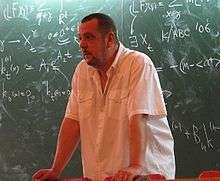Yuri Kondratiev
Yuri Kondratiev (Ukrainian: Кондратьєв Юрій Григорович; born October 23, 1953, in Kyiv, USSR) is a Ukrainian mathematician, professor at the Bielefeld University, Germany.
- His research interests include functional analysis, mathematical physics and stochastic calculus.
- Y. Kondratiev is a member of the Kyiv school of functional analysis founded by M. Krein and lead, for many years, by Y. Berezansky.
- His interests in mathematical physics were inspired by cooperation with the Moscow seminar in statistical Physics (R. Dobrushin, R. Minlos, Y. Sinai). Yuri's collaboration with A. Skorokhod has influenced most of his subsequent papers on stochastics.
Yuri Kondratiev | |
|---|---|
 Photo of Yuri Kondratiev | |
| Born | October 23, 1953 |
| Nationality | Ukrainian |
| Alma mater | Kyiv University |
| Awards |
|
| Scientific career | |
| Fields | mathematics |
| Institutions | Bielefeld University, Germany |
| Doctoral advisor | Y. Berezansky |
Biography
- In 1975, Yuri Kondratiev graduated with honours from Kyiv University.
- In 1979 he completed his PhD with thesis entitled “Generalized functions in problems of infinite dimensional analysis” at the Kyiv University.
- In 1987 Yuri obtained the Degree of Doctor of Science in the area "Spectral Analysis of Infinite Dimensional Elliptic Differential Operators”.
- Since 1991 Yuri has worked in Ukraine (Institute of Mathematics of the National Academy of Sciences of Ukraine, National Pedagogical Dragomanov University) as well as in Germany (University of Bonn, Bielefeld University) and the UK (University of Reading). Since 2008 he holds a full Professor position at the Bielefeld University.
Work
- He has written a book entitled "Spectral Methods in Infinite Dimensional Analysis" 1, 2 (1988, with Y. Berezansky, in Russian; translated into English in 1995).
- He co-authored a monograph "The Statistical Mechanics of Quantum Lattice Systems" (with S. Albeverio, Y. Kozitsky and M. Röckner).
- Together with S. Albeverio and M. Röckner Yuri initiated a systematical study of Continuous Configuration Spaces. One space of stochastic distributions is named after him («Kondratiev space»).
Selected articles
- Analysis and geometry on configuration spaces (with S. Albeverio and M. Rökner), J. Funct. Anal., 154, 444–500 (1998).
- Analysis and geometry on configuration spaces: The Gibbsian case, J. Funct. Anal., 157, 242–291 (1998).
- Harmonic analysis on configuration spaces I. General theory (with T. Kuna), IDAQP, 5, 201–233 (2002).
- On contact processes in continuum (with A. Skorokhod), IDAQP, 9, 187–198 (2006).
- Semigroup approach to non-equilibrium birth-and-death stochastic dynamics in continuum (with D. Finkelshtein and O. Kutovyi),J. Funct. Anal. 262, no. 3, 1274–1308 (2012).
gollark: It's like regular first past the post but you can select MULTIPLE options.
gollark: Approval voting best voting.
gollark: ~~in some ways they probably are~~
gollark: ~~define stable~~
gollark: Because "luck" is totally a property like that instead of a post-hoc description of low-probability events!
This article is issued from Wikipedia. The text is licensed under Creative Commons - Attribution - Sharealike. Additional terms may apply for the media files.